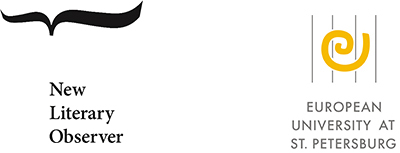
The 4th conference within the framework of joint program
"The Anthropological Turn in the Humanities and Social Sciences"
The Anthropology of Fear[1]
17-18 May 2019, St. Petersburg
Fear is a basic human emotion of nuanced character, capable of being expressed in language in various ways: as dismay, fright, terror, panic, anxiety, cowardice, trepidation, dread, apprehension, etc. There are biological fears based on threat to life, social fears based on threat to status and self-worth, and existential fears that are brought on by contemplation of the human condition.
Existential fears are related to the freedom of choice: by Soren Kierkegaard’s formulation, the wider one’s freedom of choice, the more capable one is of creativity, and the more likely one is to experience fear and anxiety; this fear is generated by the unknown and indeterminate character of the object, by the uncertainty of the consequences of choosing between this or that possibility.
Thus, as Silvan Tomkins and Carroll Izard suggest, fear curbs human pursuit of the unknown.
Religious philosophy (in particular, Jewish philosophy) distinguishes between two types of fear: there is the positive, redemptive “fear of God,” and the fear of one’s own imperfection, both of which strengthen the soul and need to be studied; there are also, however, negative, destructive, and dangerous fears, such as cowardice, fear of violence, or what the contemporary Russian philosopher Efim Kurganov calls “slavish fear.”
In different cultures there exist entire spheres of life that are regulated by fear of punishment, or spheres regulated by shame and the fear of embarrassment. Accordingly, there are also norms regulated by fear and norms regulated by shame. According to the prominent Russian scholar Yuri Lotman, the fear of shame is the highest form of negative fear.
In Leon Trotsky’s words: “Intimidation is a powerful weapon of policy, both internationally and internally.” And, as historian Michel Heller has noted, there exist systems of governance that are based primarily in fear.
The main social function of fear is to regulate power relations. Thus, fear is the result of the swinging of the “sword of the sovereign,” which Michel Foucault took to be a weapon of juridical power based in prohibitions and buttressed by the fear of punishment. Practically all human societies are bound in power relations and demonstrate asymmetries of power, and, very often, the elements holding these power relations together are fear and its inverse, intimidation.
We invite participants to consider the following key questions in relation to the conference theme:
- How is the learned behavior of fear passed on from adults to children, from one group to another? Where is the line between the protective “no!” one shouts at a child about to touch a hot pan and the precautionary “silence is golden” principle directed at the overly verbose student?
- At what moment does the fear associated with the instinct for physical self-preservation turn into the destructive fear against showing originality, initiative, and agency? In other words, when does this fear transform into what Erich Fromm calls the “escape from freedom”?
- What kinds of mechanisms for the overcoming of fear exist in concrete societies? Are there particular rituals that help us overcome feelings of doom, or help us put the affairs of life and death into a habitual sequence of compulsory mechanical actions?
- What are the social functions of cowardice and bravery?
- How is fear reflected in texts? How and why is fear shown in films? How and why is fear spoken about in literary works? What are the social functions of gothic narratives, horror films, and frightening children’s tales?
THE ORGANIZERS:
NEW LITERARY OBSERVER (launched in 1992 by a cultural historian Irina Prokhorova) is the leading Russian research, intellectual and publishing center studying Russian literature, history and culture in a global context as well as promoting contemporary Russian thought in the international academic community. At present NLO comprises 3 scholarly periodicals, 2 annual conferences, a variety of educational and intellectual projects, and over 80 books per year on literary criticism, philosophy, history, cultural and interdisciplinary studies, contemporary prose and poetry.
The main task of NLO is to seek and stimulate new approaches to studying human nature and culture, to reflect on the new challenges and rapidly changing status of academic institutions with the final aim of radically modernizing the field of human studies. The NLO authors are major international experts from almost all areas of humanities: history, philosophy, cultural studies, sociology, literary criticism, and cultural and historical anthropology.
EUROPEAN UNIVERSITY AT ST.PETERSBURG. Founded in 1994 with the active support of the city of St. Petersburg, the European University began operating as an elite graduate school in the social sciences and humanities in 1996. From its inception, the mission of EUSP has been to meet the needs of Russian social development by training a new generation of teachers and scholars in the best Russian and Western traditions. The European University is one of only a few non-state universities fully qualified by the Ministry of Education to award advanced graduate degrees. Over some 20 years, EUSP has gained an international reputation for the superb scholarship of its faculty and the training of Russia's best and brightest graduate students.
About “The Anthropological Turn in the Humanities and Social Sciences” project
The editors of the journal New Literary Observer and their colleagues at the European University at St. Petersburg, through their common interest in the promotion of new humanities scholarship and support for the expansion of global academic networks, have jointly established a series of annual international conferences on the topic of “Words and Things: The Anthropological Turn in the Humanities and Social Sciences.”
Against isolationist tendencies in academia and in the public sphere, these conferences are intended to be a platform for the presentation of Russian humanities scholarship to the international academic community, as well as a tool for fostering a new generation of humanities scholars in Russia and creating conditions for the development of new humanities centers across Russia’s regions.
The term “anthropological turn” here refers to the powerful intellectual trend that grew in momentum throughout the 20th century. Today, the “anthropologization” of the humanities can already be observed, with the emergence of new disciplines such as historical, philosophical, cultural, sociological, economic, medical, and other fields of anthropology. The majority of the many “disciplinary innovations” of the past 30 years – oral history, gender studies, urban studies, history of emotions, memory, trauma, history of everyday life, theories of the body, etc. – all, one way or another, fall within this larger anthropological turn.
A similar vector in the humanities can be seen across the work of many scholars, though there are differences among these scholars and their methodological approaches. This vector may be characterized most schematically as a move from the strict universals of totalizing constructions to the more flexible, detailed, and individualized studies of peoples and cultures, from the centrality of texts to the centrality of the visual and bodily, and from binary oppositions and intertextualities to cultural and philosophical anthropology.
In part, this “anthropological turn” is connected to the Soviet collapse: the dissolution of the Soviet Union and all its systems of sociocultural mythologemes set before Russian humanities scholars—and before all of Russian studies as a field—the tasks of critically rethinking the tool box and perspectives of the profession, generating new understandings of categories and aesthetic orientations, and reforming the cultural field and its institutions.
The broad framework of the “anthropological turn” is not intended to set bounds of the agenda for intellectual dialog. Rather, it aims to facilitate the expansion and development of new methodological approaches that are suited to the intellectual challenges of the coming era.
New Literary Observer and the European University at St. Petersburg hope that this new research program will attract the interest of colleagues from related fields and push Russian scholars out of isolation and into the international intellectual community.
[1] Previous themes have included “The Lie as a Factor of Social Life: Practices and Texts” (2016, St. Petersburg); “Dignity as a Historical Concept and as a Key Category of Our Time” (2017, Moscow); “’A Hero of Our Time’: Leaders of Public Opinion and Their Cults in the Era of (Post)Modernity” (2018, Moscow).
Image: Alexander Khodot ©
